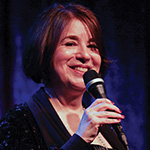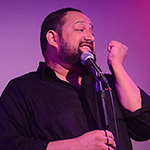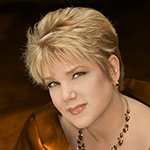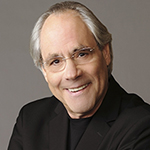Dear Lenny: Bernstein’s Life in Songs and Letters
Music Instrument Museum Music Theater, Phoenix, AZ, January 19, 2023
Reviewed by Lynn Timmons Edwards
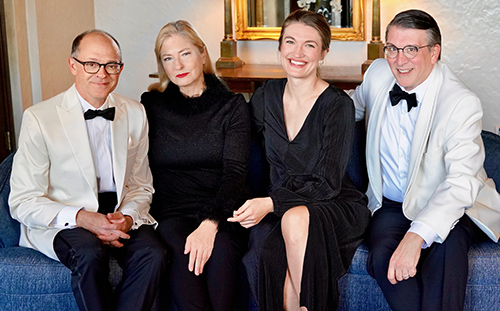
If Andrew Walesch, Artistic Director of Musical Instrument Museum (MIM) Music Theatre, had not grown up in Minnesota, this unique cabaret about Leonard Bernstein would most likely never have found its way to Arizona. Thank you, Mr. Walesch! Dear Lenny: Bernstein’s Life in Songs and Letters is the brainchild of vocalist Bradley Greenwald, who resembles Bernstein. He created it in 2018 for the centennial of Bernstein’s birth. It is a clever concept that uses letters to and from the Maestro to weave the songs and storytelling together. It covers much of Bernstein’s search for success and love from his arrival in New York City in the 1930s through the end of his life in 1990 at age 72.
According to his Facebook page, Greenwald had performed the show as recently as November at Crooners in Minneapolis with pianist/music director Dan Chouinard. He was joined by Prudence Johnson who began her collaboration with Chouinard in 2004 when they released a CD of Gershwin music and began touring together. Her roots are in folk and country, and she was a regular guest on A Prairie Home Companion. The beautiful coloratura soprano Liz Hawkinson completed the trio. Chouinard, a master at the keyboard, was joined by musicians Bruce Thornton on flute and clarinet and Greg Hippen on acoustic bass.
The cabaret used many of Bernstein’s Broadway songs as commentary and to elaborate on his life and career. The letters came from near and far, beginning with one from composer Aaron Copland, his mentor and lifelong friend. Bernstein’s psychoanalyst wrote a note in 1942 saying, “I think this is going to take some time.” Director George Abbott wrote in 1945 about how proud he was of On the Town, and there were congratulatory letters from Bette Davis, Lauren Bacall, and Cole Porter that let us know Bernstein traveled in celebratory circles. There were notes to family and friends about his constant search for love, his decision to marry and raise a family despite his sexual orientation, and the tragedy of being caught in the McCarthy era’s blacklisting. My favorite was a letter he wrote to a friend in the mid-1950s, “I’m working on that Romeo show with some boy named Stephen Sondheim.”
The trio kicked off the music with “New York, New York” from On the Town (lyrics by Betty Comden and Adolf Green). During the course of the evening, the casts’ voices warmed up and the sound became well balanced as the singers were backed by the small but mighty orchestra. Johnson took on “Lonely Town” and Greenwald the exuberant “Carried Away” with Chouinard on vocals as well as on piano.
I learned that Bernstein wrote music and lyrics for a musical adaptation of Peter Pan that ran on Broadway in 1950-51. “Who Am I?,” poignantly delivered by Greenwald, spoke of the man who searched for meaning and for his place in the world. We were treated to highlights from Wonderful Town (lyrics by Comden and Green) including “Ohio,” “One Hundred Easy Ways,” and “Wrong Note Rag.” This material showed off the harmonizing skills and overall musicianship of the three singers. The clarinet added color to the rich musical arrangements. The cabaret peaked with the music from Candide (lyrics by Richard Wilbur and John Latouche). It also reflected well on Bernstein’s double life between family and dalliance. What a thrill it was to hear Hawkinson sing “Glitter and Be Gay”; few sopranos can manage it. Little do most people know that the idea for Candide came from Bernstein’s correspondence with writer Lillian Hellman. We also got the classical flair and harmonic brilliance of “The Best of All Possible Worlds,” “Oh, Happy We,” and “Make Our Garden Grow.”
Greenwald made sure to highlight Bernstein’s social activism with his choice of material. There was an early letter to The New York Times complaining about the absence of Negros in the professional music world; it may have been inspired by a 1947 letter to Bernstein from Lena Horne. In another Times piece in the 1980s he proclaimed his commitment to liberalism. We learned that the FBI had an 800-page file on Bernstein and the cabaret included an excerpt from his 3,500-word statement to the Committee on Unamerican Activities denying any affiliation with the Communist Party and avowing his commitment to democracy. (One can only imagine his abhorrence for American government today.) At John Kennedy’s memorial, A Night of Stars, he said that leaders must be guided by learning and reason. In 1976 Bernstein wrote the music for 1600 Pennsylvania Avenue. It closed on Broadway after seven performances, and I learned online that Bernstein refused to allow a cast recording because of his anger over how his music had been condensed and edited without his consent. “Take Care of This House” was beautifully sung by Johnson, and it gave us insight into Bernstein’s patriotism.
Of course, the cabaret included songs from West Side Story (lyrics by Stephen Sondheim). Broadway material is not Johnson’s vocal forte, and “A Boy Like That” lacked the right bite, though Hawkinson soared, Puerto Rican accent and all. Martha Gellhorn, writer and long-time friend, wrote that the show was sociological history turned into art, and Sondheim wrote an amusing letter to Lenny praising the score and hoping for a lifelong friendship in which they would criticize each other’s work.
Beautiful instrumentals along with classically composed material were also included in the show. Nothing was too long, and I found the cabaret to be engaging throughout its 90 minutes. My suggestion for improvement would be to use only a single narrator; to add song titles (not just shows), more photos and memorabilia to the projections; and to take the music stands away from the singers. There could be more eye contact and connection with the audience if the songs were sung through the fourth wall and lyrics were solidly memorized.
The cast circled back to On the Town for the final song, “Some Other Time.” I cannot think of a better closer. After praising the MIM, thanking Walesch and his staff, and acknowledging the audience, we were invited to sing along for the encore, “Tonight” from West Side Story.


